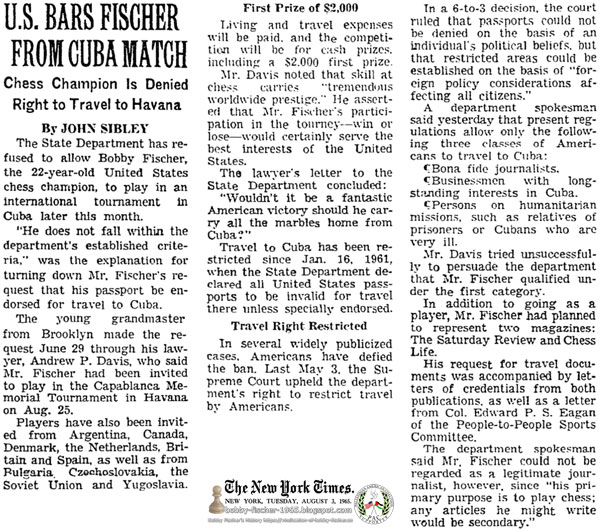The New York Times New York, New York Tuesday, August 03, 1965 - Page 28
U.S. Bars Fischer From Cuba Match — Chess Champion Is Denied Right to Travel to Havana
The State Department has refused to allow Bobby Fischer, the 22-year-old United States chess champion, to play in an international tournament in Cuba later this month.
“He does not fall within the department's established criteria,” was the explanation for turning down Mr. Fischer's request that his passport be endorsed for travel to Cuba.
The young grandmaster from Brooklyn made the request June 29 through his lawyer, Andrew P. Davis, who said Mr. Fischer had been invited to play in the Capablanca Memorial Tournament in Havana on Aug. 25.
Players have also been invited from Argentina, Canada, Denmark, the Netherlands, Britain and Spain, as well as from Bulgaria, Czechoslovakia, the Soviet Union and Yugoslavia.
First Prize of $2,000
Living and travel expenses will be paid, and the competition will be for cash prizes, including a $2,000 first prize.
Mr. Davis noted that skill at chess carries “tremendous worldwide prestige.” He asserted that Mr. Fischer's participation in the tourney —win or lose — would certainly serve the best interests of the United States.
The lawyer's letter to the State Department concluded:
“Wouldn't it be a fantastic American victory should he carry all the marbles home from Cuba?”
Travel to Cuba has been restricted since Jan. 16, 1961, when the State Department declared all United States passports to be invalid for travel there unless specially endorsed.
Travel Right Restricted
In several widely publicized cases, Americans have defied the ban. Last May 3, the Supreme Court upheld the department's right to restrict travel by Americans.
In a 6-to-3 decision, the court ruled that passports could not be denied on the basis of an individual's political beliefs, but that restricted areas could be established on the basis of “foreign policy considerations affecting all citizens.”
A department spokesman said yesterday that present regulations allow only the following three classes of Americans to travel to Cuba:
¶Bona fide journalists.
¶Businessmen with long-standing interests in Cuba.
¶Persons on humanitarian missions, such as relatives of prisoners or Cubans who are very ill.
Mr. Davis tried unsuccessfully to persuade the department that Mr. Fischer qualified under the first category.
In addition to going as a player, Mr. Fischer had planned to represent two magazines: The Saturday Review and Chess Life.
His request for travel documents was accompanied by letters of credentials from both publications, as well as a letter from Col. Edward P.S. Eagen of the People-to-People Sports Committee.
The department spokesman said Mr. Fischer could not be regarded as a legitimate journalist, however, since “his primary purpose is to play chess; any articles he might write would be secondary.”























